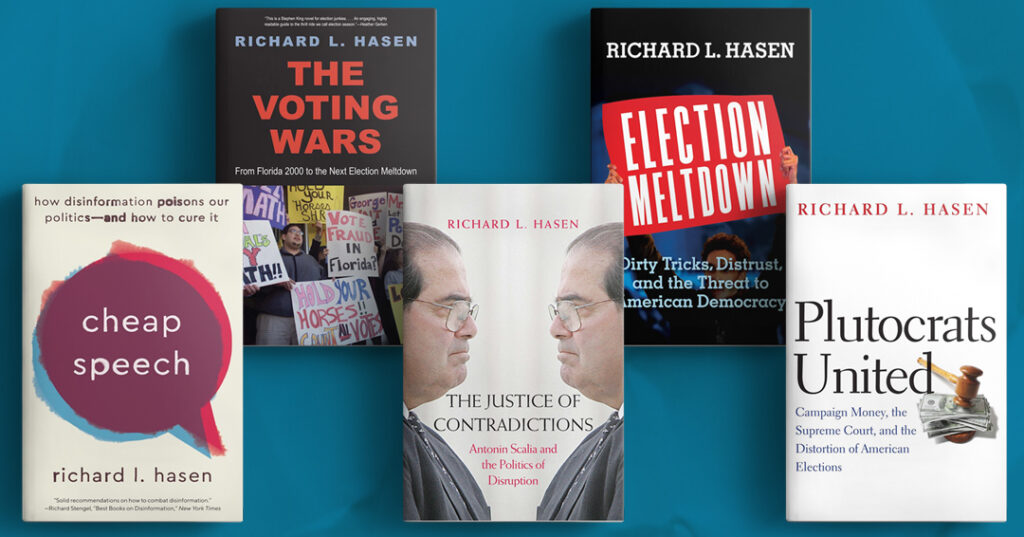Freeman hired a lawyer, though it wasn’t clear what could actually be done. But, in 2021, the lawyer was approached by a nonprofit called Protect Democracy. The group had been founded a few years earlier by former lawyers in the office of the White House counsel during the Obama Administration. Protect Democracy, which now has more than a hundred employees and a budget of thirty million dollars, aims to defend America from authoritarianism; it has worked on a range of litigation, legislation, research, communications, and software projects—including VoteShield, a platform now monitoring the integrity of voter-registration data in two dozen states—and has successfully advocated for changes to election laws. One of its founders, Ian Bassin, was recently given a MacArthur “genius” grant. But P.D. has often pursued its goals in novel ways. It has recently begun to use defamation law—which was designed to protect against reputational damage rather than authoritarian takeover—to fight against the flood of disinformation. If the group sued the right liars, its members believed, they could stop dangerous lies from spreading. The strategy has concerned some free-speech advocates. But Bassin believes that targeted defamation suits can “produce a systemic rebalancing of incentives to advance truth.” In late 2021, Protect Democracy sued Giuliani, and a half dozen others, for defamation of Freeman and Moss. Freeman, who often quotes from the Bible, told me that she felt like an underdog in the fight. “I think about David and his slingshot,” she said. “He had five smooth stones.”…
As this was unfolding, P.D. was working on what it called its “Law for Truth” strategy. “We could see the dominoes,” Rachel Goodman, a former A.C.L.U. attorney, who heads the Law for Truth project, told me. A relatively small number of individuals and media outlets, she explained, account for most election-related disinformation online. According to one study, more than half the retweets of the forty-three most prominent false or misleading stories about voting, prior to the 2020 election, originated from three dozen users. Since 1964, the protective standard in libel law has been “actual malice”: if you could show that someone had willfully lied or recklessly spread mistruths, and damaged a reputation in the process, you might hold him legally responsible. “The idea of getting accountability for people defamed as part of the Big Lie was really interesting,” Goodman said….
If there’s a center-left consensus on the perils of democratic instability at the moment, it does not extend to P.D.’s use of defamation law. Some of the pushback concerns free speech. “This kind of litigation may make liars more cautious,” Eugene Volokh, who teaches First Amendment law at U.C.L.A., told me. “But the good chilling effect on lies and the bad chilling effect on truths walk hand in hand.” In an age of incipient authoritarianism, it’s especially important that speech protections be broad, critics say, so that news organizations are not afraid of reporting on what they believe to be true. Fox invoked free speech in a recent counterclaim against Smartmatic, saying that its lawsuit is “designed to serve as a warning to others to think twice before exercising their own free speech rights.” In January, a judge allowed Fox to advance its claim. Nora Benavidez, a free-speech attorney in Atlanta, explained, “Going after the purveyors of disinformation must be very carefully done so we don’t develop case law that ultimately undermines free speech—which, by its very nature, includes lies.”
Samantha Hamilton, an attorney at the University of Georgia Law School’s First Amendment Clinic, told me that defamation law was a deficient tool in the fight against disinformation because the biggest lies, such as “The election was stolen” or “Vaccines don’t work,” typically don’t cause reputational harm to a specific individual. “Defamation really doesn’t have a role to play,” she said. Bassin defends the project’s results so far. Ten days after OAN was served with the lawsuit, DirecTV informed OAN that it would not renew the network’s contract that spring. Bassin acknowledged that several factors were at play but told me, “Our complaint was the straw that broke the camel’s back.” Soon after, Verizon also cut ties with OAN. “As a result of us filing, there’s a good case to be made that OAN lost access to a quarter of U.S. households with TVs,” Bassin said. (A spokesperson for DirecTV told me that its decision was primarily financial.) Still, as Benavidez pointed out, even millions in damages might have little long-term effect on behemoths like Fox. “It’s just the cost of doing business now,” she said.
Behavioral experts have also found that most people tend to discount or reframe new information, like legal verdicts, that don’t fit into their belief systems. This form of cognitive bias complicates the problem of disinformation and potentially undermines attempts to fix it with verdicts. “If we’re expecting defamation law to do much of the heavy lifting in solving a complex issue like disinformation, I think we’re expecting too much,” Hamilton said. During the Giuliani trial, I noticed an audience member in the courtroom, a lawyer named Fletcher Thompson, who seemed distressed. During a bathroom break, I approached him. After days of testimony, he was still convinced that Biden had stolen the election. “I can see what happened,” he told me. “I make my own inferences. I think there was a plan to do this.”
Law for Truth plans to file more suits in the coming months. Ultimately, though, Bassin and his colleagues understand that P.D.’s impact has limits. Democracy is neither a natural system nor an easy one to maintain…
